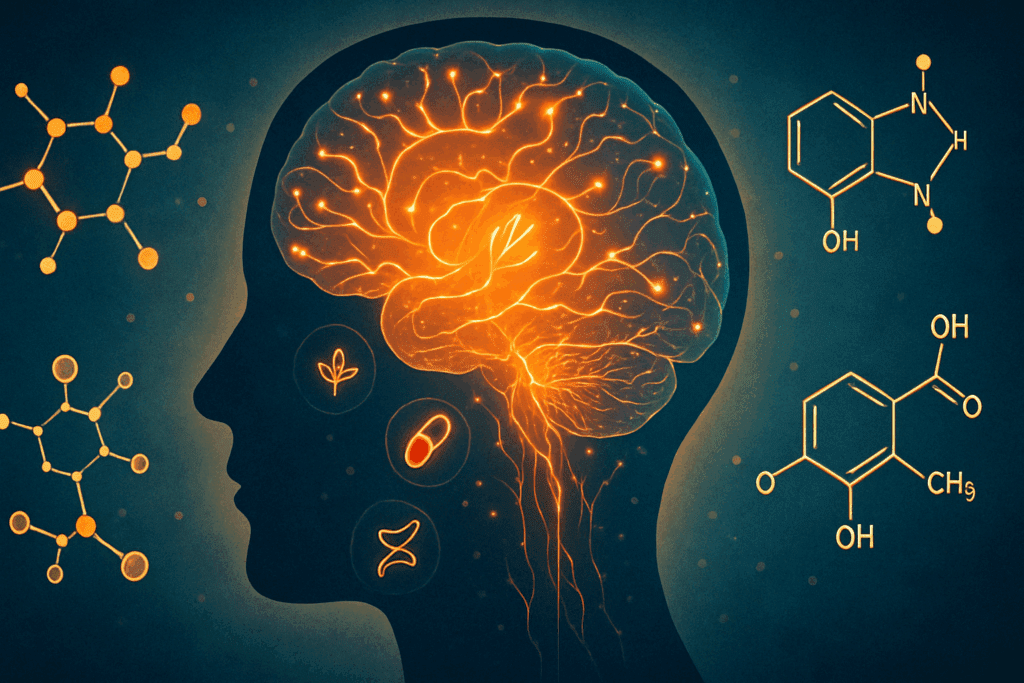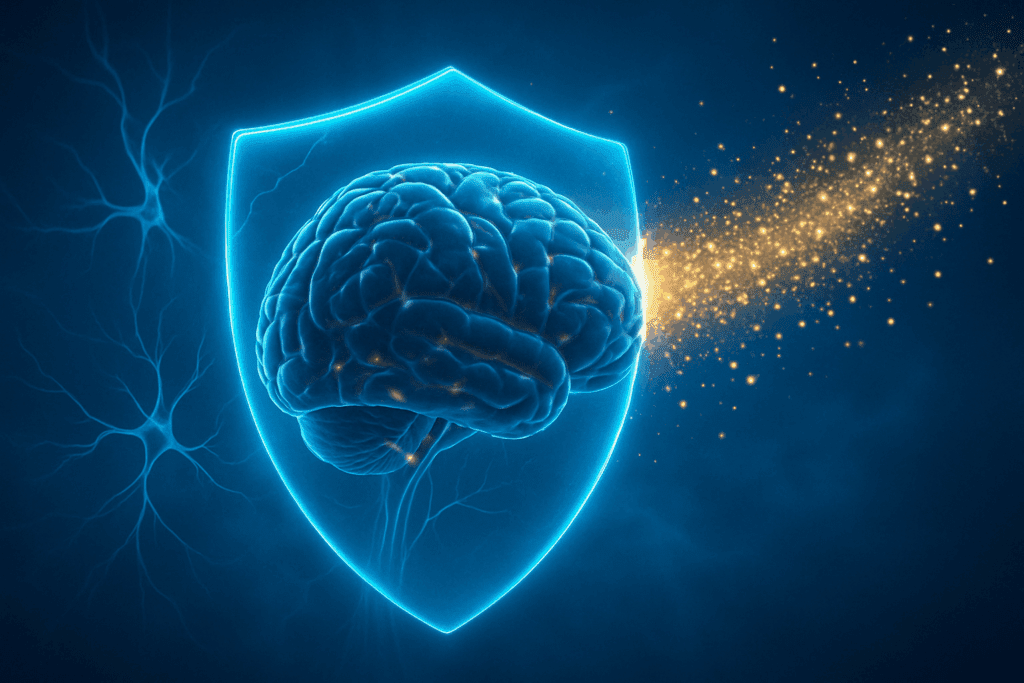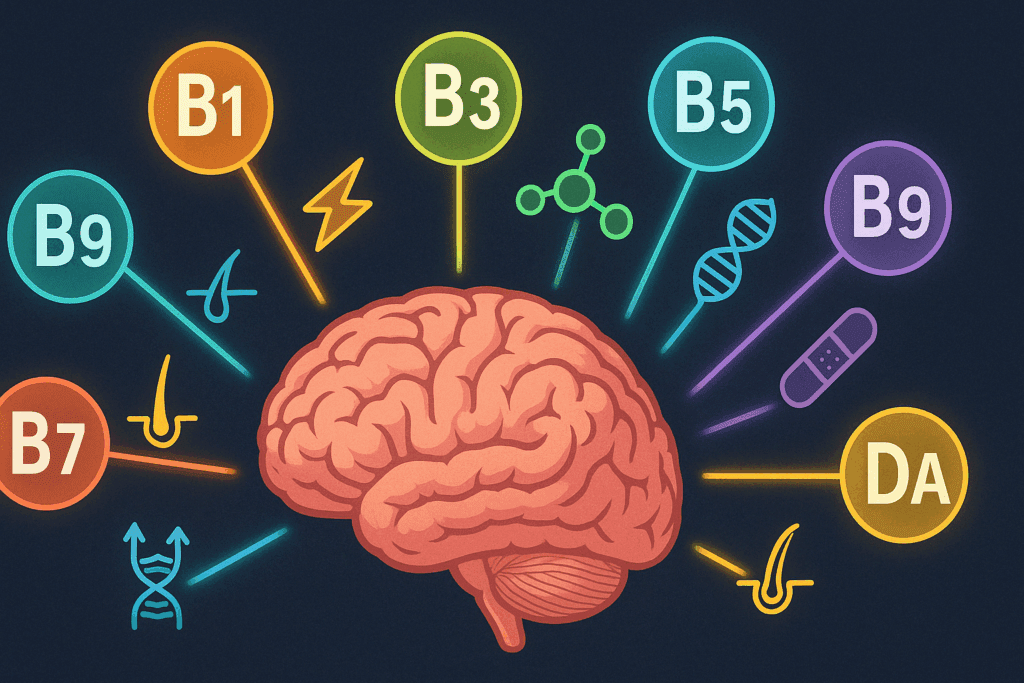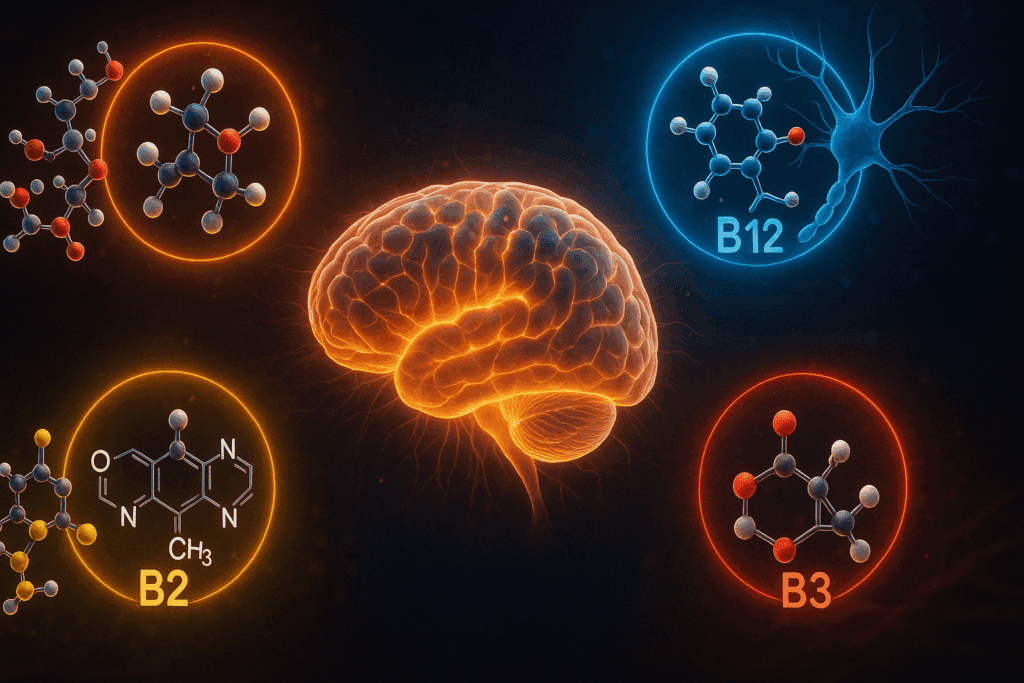Introduction: Unlocking the Link Between Vitamin B and Brain Vitality
In the pursuit of optimal cognitive health, the role of nutrition is often underestimated. Yet, as emerging research consistently demonstrates, what we feed our bodies directly influences the sharpness of our minds. Among the nutrients that stand out, the family of B vitamins has captured considerable scientific attention for its profound influence on brain function and mental clarity. Understanding the intricate relationship between vitamin B for brain health is essential for anyone seeking to preserve cognitive vitality, enhance focus, and maintain emotional resilience throughout life.
You may also like: Where to Buy Bacopa Monnieri: How to Find Quality Supplements for Cognitive and Memory Support
The term “vitamin B” encompasses a diverse group of eight distinct compounds, each contributing unique but interrelated benefits to the brain and nervous system. From the generation of neurotransmitters to the maintenance of cellular energy production, B vitamins perform foundational tasks that support every aspect of neurological function. The growing body of evidence linking vitamin B for brain function to improved memory, mood regulation, and even potential protection against neurodegenerative diseases invites a closer exploration.
In this comprehensive guide, we will examine the science behind B vitamins for brain health, highlight the specific roles of individual B vitamins, and address practical considerations for supplementation and dietary intake. Our journey will be guided by the latest peer-reviewed studies, ensuring that the information provided not only captivates but also upholds the highest standards of scientific accuracy and credibility. Whether you are a student aiming to optimize learning capacity or someone seeking ways to maintain cognitive sharpness into later life, understanding the power of vitamin B for brain vitality is an essential step toward achieving these goals.

Understanding the Essential Role of B Vitamins in Cognitive Health
B vitamins are not merely supportive players in the drama of human biology; they are integral to its most fundamental processes. Their contribution to brain function extends from basic energy production to the regulation of complex neurotransmitter systems that govern thought, emotion, and memory. A deficiency in any one of these vitamins can manifest as subtle cognitive impairments initially, eventually progressing to more serious neurological conditions if left unaddressed.
One of the primary ways that vitamin B for brain function asserts its importance is through its role in energy metabolism. The brain, despite comprising only about 2% of body weight, consumes roughly 20% of the body’s energy. B vitamins—especially B1 (thiamine), B2 (riboflavin), B3 (niacin), and B5 (pantothenic acid)—facilitate the biochemical reactions that release energy from the food we eat. Without sufficient B vitamin intake, cognitive fatigue and mental sluggishness can become daily realities.
Moreover, several B vitamins are intimately involved in the synthesis and regulation of neurotransmitters such as serotonin, dopamine, and GABA, which influence mood stability, memory formation, and stress resilience. For instance, vitamin B6 (pyridoxine) is essential for converting amino acids into neurotransmitters, directly impacting how effectively the brain communicates within itself. The importance of vitamin B for brain health thus lies not only in the raw energy it provides but also in its fine-tuning of the brain’s chemical messengers, which orchestrate our thoughts, emotions, and actions.
Furthermore, certain B vitamins, notably B9 (folate) and B12 (cobalamin), play pivotal roles in maintaining the structural integrity of neurons through processes such as DNA synthesis and repair, and the creation of myelin—the protective sheath that insulates nerve fibers. This dual function of providing both biochemical support and structural maintenance highlights why deficiencies in these vitamins are often associated with conditions like depression, cognitive decline, and dementia. Recognizing the multilayered importance of B vitamins for brain health underscores why they deserve attention in any discussion of cognitive enhancement strategies.

Frequently Asked Questions: Vitamin B for Brain Function and Brain Health
1. How can vitamin B for brain support help with long-term cognitive resilience?
While many people recognize vitamin B for brain function as essential for short-term energy and mental clarity, emerging research highlights its role in long-term cognitive resilience. Specifically, B vitamins for brain health help protect neurons from oxidative stress and inflammation, both of which are linked to aging-related cognitive decline. Advanced studies suggest that maintaining optimal vitamin B for brain levels may slow the progression of conditions like mild cognitive impairment. By supporting the integrity of neuronal membranes and neurotransmitter synthesis, these nutrients promote more robust cognitive networks over time. Incorporating a well-balanced diet rich in B vitamins for brain health could therefore be a proactive step for those aiming to preserve mental sharpness into older adulthood.
2. Are there specific lifestyle factors that make vitamin B for brain function even more effective?
Yes, lifestyle factors like regular physical exercise, sufficient sleep, and stress management significantly amplify the benefits of vitamin B for brain function. Research indicates that when physical activity is combined with optimal vitamin B for brain intake, the body’s ability to produce new brain cells (neurogenesis) improves markedly. Sleep quality also affects how well the brain utilizes B vitamins for brain health, as critical restorative processes occur during deep sleep cycles. Moreover, stress can deplete B vitamins rapidly, making supplementation even more crucial for people with high-demand lifestyles. Therefore, a holistic approach combining healthy habits with strategic nutritional support is key for maximizing brain performance.
3. What are some overlooked signs that you might need more vitamin B for brain support?
Beyond classic symptoms like fatigue or memory lapses, lesser-known signs suggesting a need for more vitamin B for brain support include mood fluctuations, difficulties with complex problem-solving, and a reduced sense of mental stamina. Studies show that even mild vitamin B for brain function deficiencies can affect executive functioning, such as planning, focus, and emotional regulation. Subclinical symptoms are often missed because they progress gradually, but catching them early is vital for maintaining brain vitality. B vitamins for brain health also play a major role in neurotransmitter balance, meaning subtle mental health shifts may signal an underlying nutritional gap. Listening to your body’s early cues can be a game-changer for cognitive wellness.

4. How does vitamin B for brain function differ across various age groups?
The importance of vitamin B for brain function evolves with age. In younger individuals, B vitamins primarily support neurodevelopment, energy metabolism, and early learning processes. As adults transition into middle age, vitamin B for brain health becomes vital for managing stress, maintaining memory accuracy, and sustaining focus amid growing life demands. In older populations, deficiencies in vitamin B for brain support are more common and are linked to higher risks of cognitive impairment and neurodegenerative conditions. Thus, tailoring your vitamin B intake based on life stage ensures your brain’s changing needs are met proactively.
5. What are some cutting-edge research developments around vitamin B for brain health?
One exciting area of research explores the synergistic effects of combining vitamin B for brain support with other nootropics, such as omega-3 fatty acids and polyphenols. Clinical trials are showing that B vitamins for brain health may enhance the absorption and effectiveness of these compounds, leading to even greater improvements in memory and mental flexibility. Scientists are also investigating personalized nutrition approaches, using genetic markers to predict who will benefit most from specific vitamin B protocols. This evolving field promises highly targeted interventions, maximizing the brain-boosting potential of vitamin B for brain function in individualized ways.
6. Can vitamin B for brain function impact creative thinking?
Absolutely. Creative cognition involves complex brain pathways that rely heavily on neurotransmitter production, and vitamin B for brain function is fundamental to these processes. Particularly, B6, B9, and B12 facilitate the synthesis of dopamine and serotonin—chemicals directly linked to mood regulation and imaginative thinking. Artists, writers, and innovators often unknowingly benefit from optimized B vitamins for brain health, which support more fluid thought processes and flexible problem-solving. By promoting better neural communication and faster information retrieval, vitamin B for brain support can lead to more frequent “aha!” moments and deeper creative insights.
7. How do different types of B vitamins uniquely contribute to brain health?
Each type of B vitamin plays a distinct but interconnected role in brain function. For example, B1 (thiamine) is crucial for energy metabolism within brain cells, while B6 (pyridoxine) helps in neurotransmitter production. B9 (folate) is vital for DNA repair and neurodevelopment, and B12 (cobalamin) supports myelin sheath integrity for faster signal transmission. When considering vitamin B for brain supplementation, it’s important to address the full spectrum rather than isolated compounds. A comprehensive approach ensures the synergy among all B vitamins for brain health, maximizing mental energy, emotional balance, and cognitive endurance.
8. What practical steps can someone take to optimize vitamin B for brain function naturally?
First, focus on diet: foods rich in vitamin B for brain support include leafy greens, eggs, salmon, and fortified cereals. Pairing these foods with healthy fats can improve absorption, particularly for vitamins like B12. Next, consider stress management strategies—chronic stress depletes vitamin B stores rapidly, reducing their effectiveness in supporting cognitive health. Regular blood testing can also help monitor levels of B vitamins for brain health to catch potential deficiencies early. Finally, consult a healthcare provider about smart supplementation options, especially if you follow a restrictive diet (like veganism) that may limit natural intake of key B vitamins.

9. Could vitamin B for brain support aid recovery from mental burnout?
Emerging research suggests that vitamin B for brain support can be instrumental in recovery from mental burnout. During periods of extreme stress and exhaustion, the brain’s demand for critical nutrients skyrockets, and B vitamins for brain health become even more essential for repairing neural pathways. Supplementing with targeted B-complex vitamins can help replenish depleted neurotransmitters, improve mood, and accelerate mental recovery. Some clinicians are now incorporating high-dose vitamin B therapy as part of holistic treatment plans for cognitive fatigue. However, it’s vital to approach supplementation thoughtfully and under professional guidance to ensure proper dosing and avoid imbalances.

10. What future trends could shape how we use vitamin B for brain function?
Future trends point toward personalized vitamin B for brain optimization based on DNA testing and gut microbiome analysis. Scientists are discovering that individual genetic variations significantly influence how effectively people absorb and utilize different B vitamins for brain health. Technology is also making it possible to track real-time biomarkers related to cognitive function, allowing for dynamic adjustments in vitamin B protocols. Additionally, bioavailable forms of vitamin B for brain support, such as methylated B vitamins, are gaining popularity due to their superior absorption and potency. As our understanding deepens, tailored brain health strategies incorporating advanced forms of vitamin B are set to become mainstream.

The Individual Powers: A Closer Look at Each B Vitamin for Brain Function
While collectively referred to as “B vitamins,” each member of this family carries unique responsibilities critical to brain function. Understanding their individual contributions provides a more nuanced view of how vitamin B for brain health truly operates.
Thiamine (B1) is essential for glucose metabolism in the brain, and its deficiency is famously linked to Wernicke-Korsakoff syndrome, a serious neuropsychiatric disorder. Even subclinical deficiencies can impair memory, focus, and overall cognitive energy. Riboflavin (B2) supports mitochondrial energy production and has been shown to help reduce the frequency and severity of migraines, hinting at its neuroprotective potential. Niacin (B3) is crucial for DNA repair and cell signaling in the brain, with emerging studies suggesting that it may play a role in preventing neurodegeneration.
Pantothenic acid (B5) is often overshadowed in discussions of brain nutrients, yet it is indispensable for the synthesis of coenzyme A, a molecule involved in the production of acetylcholine—a neurotransmitter critical for learning and memory. Pyridoxine (B6) directly influences neurotransmitter synthesis, with inadequate levels linked to irritability, depression, and impaired cognitive performance. Folate (B9) is a key player in one-carbon metabolism, a process vital for DNA methylation, gene expression regulation, and neural tube development during pregnancy.
Vitamin B12 (cobalamin) works synergistically with folate in DNA synthesis and is paramount for maintaining the myelin sheath that encases neurons. Deficiency in B12 can lead to irreversible neurological damage if not addressed promptly. Finally, biotin (B7), while primarily recognized for its role in skin and hair health, also supports gene regulation and cellular energy production in the nervous system. Together, these vitamins compose a powerful arsenal in the maintenance and optimization of brain function, each reinforcing the others’ actions and illustrating the holistic nature of vitamin B for brain health.
Was this article helpful? Don’t let it stop with you. Share it right now with someone who needs to see it—whether it’s a friend, a colleague, or your whole network. And if staying ahead on this topic matters to you, subscribe to this publication for the most up-to-date information. You’ll get the latest insights delivered straight to you—no searching, no missing out.
Further Reading:
The Role of B Vitamins in Preventing and Treating Cognitive Impairment and Decline
Brain Supplements That Do and Don’t Work
Important Note: The information contained in this article is for general informational purposes only, and should not be construed as health or medical advice, nor is it intended to diagnose, prevent, treat, or cure any disease or health condition. Before embarking on any diet, fitness regimen, or program of nutritional supplementation, it is advisable to consult your healthcare professional in order to determine its safety and probable efficacy in terms of your individual state of health.
Regarding Nutritional Supplements Or Other Non-Prescription Health Products: If any nutritional supplements or other non-prescription health products are mentioned in the foregoing article, any claims or statements made about them have not been evaluated by the U.S. Food and Drug Administration, and such nutritional supplements or other health products are not intended to diagnose, treat, cure, or prevent any disease.


